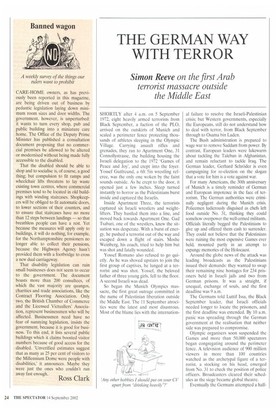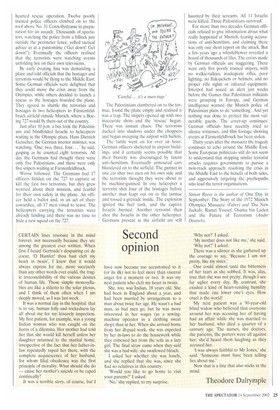THE GERMAN WAY WITH TERROR
Simon Reeve on the first Arab
terrorist massacre outside the Middle East
SHORTLY after 4 a.m. on 5 September 1972, eight heavily armed terrorists from Black September, a faction of the PLO, arrived on the outskirts of Munich and scaled a perimeter fence protecting thousands of athletes sleeping in the Olympic Village. Carrying assault rifles and grenades, they ran to Apartment One, 31 Connollystrasse, the building housing the Israeli delegation to the 1972 'Games of Peace and Joy', and crept into the foyer. Yossef Gutfreund, a 6ft Sin wrestling referee, was the only one woken by the faint sounds outside. As he crept to the door, it opened just a few inches. Sleep turned instantly to horror as the Palestinians burst inside and captured the Israelis.
Inside Apartment Three, the terrorists captured six Israeli wrestlers and weightlifters. They hustled them into a line, and moved back towards Apartment One. Gad Tsabari, one of the wrestlers, knew the situation was desperate. With a burst of energy, he pushed a terrorist out of the way and escaped down a flight of stairs. Moshe Weinberg, his coach, tried to help him but was shot and fatally wounded.
Yossef Romano also refused to go quietly. As he was shoved upstairs to join the first group of captives, he lunged at a terrorist and was shot. Yossef, the beloved father of three young girls, fell to the floor. A second Israeli was dead.
So began the Munich Olympics massacre, the first great outrage committed in the name of Palestinian liberation outside the Middle East. The 11 September atrocities were the latest and most disastrous. Most of the blame lies with the internation al failure to resolve the Israeli-Palestinian crisis; but Western governments, especially the Europeans, still do not understand how to deal with terror, from Black September through to Osama bin Laden.
The Bush administration is prepared to wage war to remove Saddam from power. By contrast, European leaders were lukewarm about tackling the Taleban in Afghanistan, and remain reluctant to tackle Iraq. The German leader, Gerhard SchrOder is even campaigning for re-election on the slogan that a vote for him is a vote against war.
For many Americans, the 30th anniversary of Munich is a timely reminder of German and European impotence in the face of terrorism. The German authorities were criminally negligent during the Munich crisis. Policemen ludicrously disguised as chefs left food outside No. 31, thinking they could somehow overpower the well-armed militants. Officials literally begged the Palestinians to give up and offered them cash to surrender. They could not believe that the Palestinians were ruining the most expensive Games ever held, mounted partly in an attempt to expunge memories of the Holocaust.
Around the globe news of the attack was leading broadcasts as the Palestinians issued their demands: they wanted to swap their remaining nine hostages for 234 prisoners held in Israeli jails and two from German prisons. It was a straight, if unequal, exchange of souls, and the first deadline was 9 a.m.
The Germans told Luttif Issa, the Black September leader, that Israeli officials needed longer to locate the prisoners, and the first deadline was extended. By 10 a.m. panic was spreading through the German government at the realisation that neither side was prepared to compromise.
Olympic organisers soon suspended the Games and more than 50,000 spectators began congregating around the perimeter fence. A television audience of 900 million viewers in more than 100 countries watched as the archetypal figure of a terrorist, a stocking on his head, emerged from No. 31 to check the position of police officers. Broadcasters cleared their schedules as the siege became global theatre.
Eventually the Germans attempted a half hearted rescue operation. Twelve poorly trained police officers climbed on to the roof above No. 31 Connollystrasse in preparation for an assault. Thousands of spectators, watching the police from a hillock just outside the perimeter fence, yelled tactical advice as at a pantomime (Get down! Get down!'). Eventually the officers realised that the terrorists were watching events unfolding live on their own televisions.
By early evening Issa was demanding a plane and told officials that the hostages and terrorists would be flying to the Middle East. Some German officials were delighted that they could move the crisis away from the Olympics, while others decided to launch a rescue as the hostages boarded the plane. They agreed to shuttle the terrorists and hostages in two helicopters to Rirstenfeldbruck airfield outside Munich, where a Boeing 727 would fly them out of the country.
Just after 10 p.m. a bus took the Palestinians and blindfolded Israelis to helicopters waiting in the Olympic plaza. Hans Dietrich Genscher, the German interior minister, was watching. 'One, two, three. four. . 'he said, gasping as he counted eight terrorists. All day the Germans had thought there were only five Palestinians, and there were only five snipers waiting at Fiirstenfeldbruck.
Worse followed. The Germans had 17 officers hidden on the 727 to capture or kill the first two terrorists, but they grew worried about their mission, and fearful for their own safety in the plane. An officer held a ballot and, in an act of sheer cowardice, all 17 men voted to leave, The helicopters carrying the terrorists were already landing and there was no time to hide a new squad on the 727. The Palestinians clambered on to the tarmac, found the plane empty and realised it was a trap. The snipers opened up with two inaccurate shots and the 'rescue' began. There was instant chaos, The terrorists ducked into shadows under the choppers and began sweeping the airport with bullets.
The battle went on for over an hour. German officers sheltered in airport buildings, and it certainly seems possible that their bravery was discouraged by latent anti-Semitism. Eventually armoured cars blundered on to the airfield. The gunner in one car shot two men on his own side and the terrorists thought they were about to be machine-gunned. In one helicopter a terrorist shot four of the hostages before another man leapt out on to the tarmac and tossed a grenade inside. The explosion ignited the fuel tank, and the captive Israelis burned. Another terrorist then shot the Israelis in the other helicopter. Germans present at the airfield are still haunted by their screams. All 11 Israelis were killed. Three Palestinians survived, For more than two decades German officials refused to give information about what really happened at Munich, fearing accusations of anti-Semitism, and claiming there was only one short report on the attack. But a few years ago a whistleblower revealed a hoard of thousands of files. The errors made by German officials are staggering. There were only five poorly trained snipers, with no walkie-talkies, inadequate rifles, poor lighting, no flak-jackets or helmets, and no proper rifle sights or infrared equipment. Interpol had issued an alert just weeks before the Games that Palestinian militants were grouping in Europe, and German intelligence warned the Munich police of Palestinian plans to do 'something'. And yet nothing was done to protect the most vulnerable guests. The cover-up continues: German officials have recently tried to silence witnesses, and film footage showing events at Fiirstenfeldbruck has been stolen.
Thirty years after the massacre the tragedy continues to echo around the Middle East. Some European politicians still do not seem to understand that stopping similar terrorist attacks requires governments to pursue a twin-track approach: resolving the crisis in the Middle East to the benefit of both sides, and aggressively targeting the psychopaths who lead the terror organisations.
Simon Reeve is the author of One Day in September: The Story of the 1972 Munich Olympics Massacre (Faber) and The New Jackals: Ramzi Yousef, Osama bin Laden and the Future of Terrorism (Andre Deutsch).











































































 Previous page
Previous page